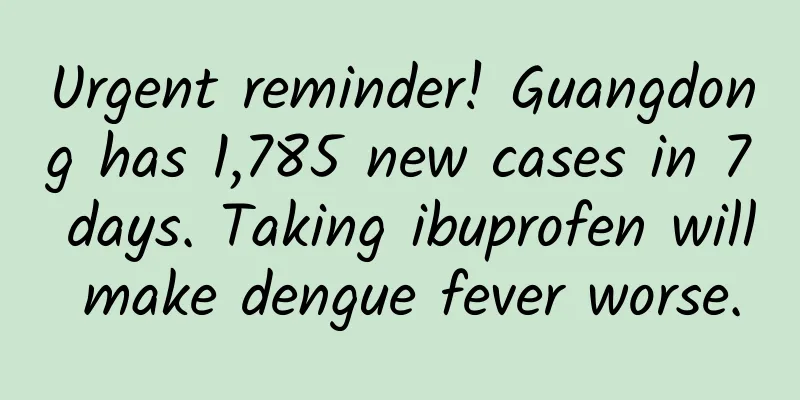Urgent reminder! Guangdong has 1,785 new cases in 7 days. Taking ibuprofen will make dengue fever worse.

|
Recently, the news that #Guangdong added 1785 new dengue cases in 7 days# has become a hot search, attracting widespread attention. Disease control centers in many provinces have issued alerts, reminding everyone to be vigilant about the risk of imported cases and to pay extra attention. Shenzhen Disease Control Center has even urgently reminded that " taking ibuprofen will make the situation worse ." Image source: Weibo screenshot So, what exactly is dengue fever and why does taking ibuprofen make it worse? What is dengue fever? Dengue fever is an epidemic disease that is widely prevalent in tropical and subtropical countries and regions such as Southeast Asia, the Western Pacific region and southern Africa. In recent years, dengue fever outbreaks in China have mainly come from imported cases from overseas , mainly from Southeast Asian and South Asian countries such as Myanmar, Cambodia, Indonesia, Thailand, Laos and Malaysia. Therefore, dengue fever in China is also mostly prevalent in areas that have close contact with these countries, such as coastal or border areas such as Guangdong and Yunnan. Dengue fever is transmitted by mosquitoes carrying the dengue virus. Infected people usually develop symptoms 4 to 7 days, or even two weeks after being bitten by a mosquito carrying the dengue virus. Symptoms generally last 5 to 7 days. Symptoms of dengue fever vary greatly from person to person and can be mild or severe. They may include the following: ● Fever; ● Headache; ● Eye socket pain; ● Joint and muscle pain; ● Feeling tired, sometimes lasting for days to weeks; ● A rash, which may be flat or have small papules and may itch. Studies have found that patients with first-time dengue infection are more likely to develop a rash. ● Stomach upset, such as nausea, vomiting and diarrhea; ● Cough, sore throat and nasal congestion; ● Small purple spots on the skin or black stools; ● Red eyes; ● Swollen lymph nodes. In general, most of the symptoms of dengue fever are very similar to those of the common cold and influenza, and it is difficult to distinguish them based on the symptoms alone. Moreover, the symptoms of children and young people who are infected are often milder. Therefore, doctors often combine local epidemic characteristics and the patient's travel history to help diagnose the disease. Medical institutions with conditions can also confirm the diagnosis through laboratory tests. Therefore, if you find yourself or your family facing the above symptoms and have been bitten by a mosquito recently, it is recommended that you go to a medical institution for treatment in time. Copyright images in the gallery. Reprinting and using them may lead to copyright disputes. Beware! Secondary infection with dengue fever The condition will get worse Dengue fever can be reinfected, and the risk of developing severe symptoms is higher if you are infected with the dengue virus again. This is because the unpredictable dengue virus has four different serotypes (DENV-1, DENV-2, DENV-3 and DENV-4), and the cross-immunity protection between each serotype is low. Therefore, after being infected with one serotype, when infected with another serotype again, the human immune system will show an " antibody-dependent enhancement " (ADE) response mechanism to the dengue virus. In simple terms, "antibody-dependent enhancement" (ADE) means that when a person is infected with dengue virus for the first time, they will produce specific antibodies to fight the virus. However, when they are infected with dengue virus for the second time, these antibodies will not only fail to fight the virus, but will bind to the virus and enhance its ability to infect . This effect will cause the virus to multiply rapidly in the body, aggravating the condition. Therefore, the most important thing to do when facing dengue fever is to take good precautions. And the best way to prevent dengue fever is to avoid being bitten by mosquitoes carrying the dengue virus. Some people may ask: "What should I do if I don't know which mosquitoes carry the virus?" Then try to avoid being bitten by all mosquitoes . Specific measures and suggestions: ● The peak of mosquito activity usually occurs 1 to 2 hours before sunrise in the morning and 2 to 3 hours before sunset in the evening, and is more frequent in the evening than in the morning. Therefore, it is best to stay indoors during this period and prepare necessary mosquito-proof measures such as screens and mosquito nets in the house; ● Wear shoes, long-sleeved shirts, long pants, and a hat when going out; ● Use mosquito repellent containing DEET or icaridin; ● Check for places with stagnant water near your home and deal with them properly, such as pools, buckets, and plants in pots, as mosquitoes breed in stagnant water. Dengue infection Taking ibuprofen can make your condition worse As with most other viruses, there is currently no specific medicine for dengue virus infection, and treatment mainly focuses on symptomatic relief of symptoms. As mentioned above, after being infected with dengue fever, most people experience symptoms of fever and pain, and these two symptoms can usually be relieved with "antipyretic analgesics", the most commonly used of which are acetaminophen and ibuprofen. But please note that it is not recommended to use ibuprofen when infected with dengue fever, as it may make the condition worse! This is because the dengue virus may affect the body's coagulation function, causing the number of platelets in the infected person to decrease, resulting in abnormal coagulation function and bleeding tendency, such as nose bleeding, bleeding gums, skin bleeding, gastrointestinal bleeding, etc. Ibuprofen belongs to the class of nonsteroidal anti-inflammatory drugs (NSAIDs), which mainly work by inhibiting the activity of cyclooxygenase (COX). On the one hand, ibuprofen has antipyretic, analgesic and anti-inflammatory effects, and is often used to relieve pain and reduce fever. On the other hand, it affects the function of platelets and increases the risk of bleeding. For other viruses, the risk is low, but for a disease like dengue, where the risk of bleeding is already high, using ibuprofen doubles the risk . In addition, apart from ibuprofen, aspirin and other non-steroidal anti-inflammatory drugs are not recommended, and acetaminophen is recommended as the first choice. Finally, it is necessary to emphasize that although the dengue virus is terrible, according to current data, there are not many severe cases and deaths caused by it, so there is no need to panic. Take good protection, do not use drugs indiscriminately, and leave the rest to professional doctors. Planning and production Author: Liu Ziqi, Chief Pharmacist, First Affiliated Hospital of Harbin Medical University Reviewer: Li Dongzeng, Chief Physician, Department of Infectious Diseases, Beijing Youan Hospital Planning丨Lin Lin Editor: Lin Lin Proofread by Xu Lai The cover image and the images in this article are from the copyright library Reprinting may lead to copyright disputes |
<<: Qin Shi Huang: No one knows figures better than me!
Recommend
iOS 16.4 will add new features that have been withdrawn
In the iOS 16.2 update, Apple intended to release...
Say Goodbye to Singleness: When Love Knocks on the Door Baidu Cloud Download
Say Goodbye to Singleness: When Love Knocks on th...
The top 10 trends in medical SEM under Baidu’s crackdown!
Written in front Recently, Baidu, the leader in C...
If you don’t understand, just ask, what is the difference between a mobile phone that costs more than 1,000 yuan and a mobile phone that costs 6,000 or 7,000 yuan?
It is said that mobile phones are getting more an...
“Happiness Trap” – Can we be happy as long as we are happy?
Half a year ago, "good luck" came to me...
Advertising results are always poor? Have you done these 5 things?
When you first came into contact with the Interne...
With closed 4S stores and consumers being left with pitfalls, and the industry undergoing transformation, how can we avoid pitfalls when buying a car?
Recently, news of dealers withdrawing from the ne...
Mobile terminal routing layer design
What is the mobile routing layer? The concept of ...
Decoding: What’s so great about Alibaba’s operations?
If we ask the operations people a question now: W...
Why are more and more people suffering from allergies? It’s all because of them!
Why do I suddenly have allergies when I was fine ...
The gap between Chinese and American TV series from the second season of Fargo
Compared with the popular domestic TV series, Ame...
Rails framework default JavaScript bundler "Webpacker" officially retired
Rails is a web application framework, one of the ...
How to know in advance when an earthquake is coming?
At 12:52 on September 5, 2022, a 6.8-magnitude ea...
4 steps to create a National Day marketing campaign plan!
I have read many books on training marketing dire...
How effective is Momo advertising? Explanation of Momo advertising!
In the past two years, mobile Internet has been e...









